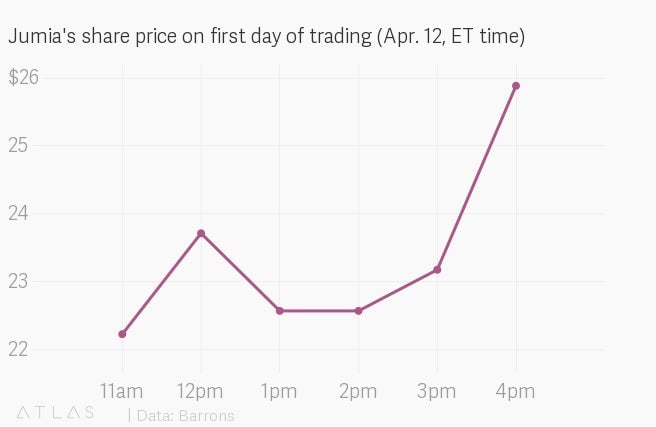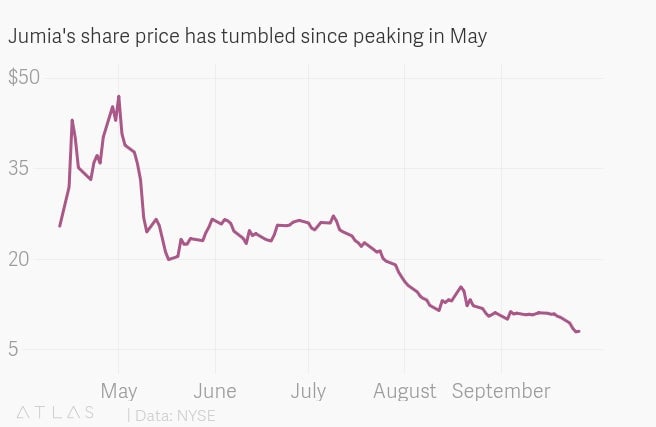Quartz Africa Weekly Brief: The year-end edition
Hi, Quartz Africa readers!

Hi, Quartz Africa readers!
Your faves
Quartz Africa published hundreds of stories this year on a wide range of topics from business and economics to tech and innovation but also plenty of science, migration and untold African history. This email wraps up a few of our best-read, most-shared, even controversial stories.
Quartz Africa Weekly Brief returns on Jan. 11. Thank you for reading and supporting us throughout 2019. We look forward to seeing you on the other side. Here’s wishing you all the best for 2020.
— Yinka Adegoke, Quartz Africa editor
Africa’s innovators
How a Kenyan furniture business is using waste to become the IKEA of Africa. Across the world, companies are being encouraged to adopt green technologies and deploy climate mitigating practices while making their products. For FunKidz, a Nairobi-based brand gunning to be the IKEA of Africa, creating sustainable and eco-friendly furniture has become a necessity rather than an option.
South Africa’s township foods are being remade as gourmet dishes by a new generation of chefs
. Despite facing barriers to entry including a lack of financial resources and cultural capital, young chefs in South Africa are flipping the script. As
, a new generation of chefs are trying to bridge the gap between historically suppressed food culture and the modern interpretation of fine dining.
Quartz Africa Innovators 2019. We published the 5th annual Quartz Africa Innovators list in September. As with previous editions we had 30 Africans who have dedicated vast amounts of their time and energy to improving their local communities and countries–and ultimately the wider continent–by focusing on solving one or more problems.
Africa’s innovative entrepreneurs will play a crucial role in combating bad governance. The role of innovation and entrepreneurship as a potential substitute for good governance in Africa is often the subject of debate. For his part, Efosa Ojomo argued that while innovation and entrepreneurship will not solely solve challenges of weak governance and deliver societal transformation, it remains the best vehicle to help combat it.
Leaving or staying
The Trump administration clamped down on US visas for Nigerians. As part of measures believed to be a clampdown on visa overstays, the United States has indefinitely suspended its interview waiver program for Nigerians seeking to renew visas.
Nigeria’s ongoing middle-class brain drain is costing it two generations in one swoop. As thousands of Nigerian professionals emigrate, or try to, one common theme for their move has been to seek better education for their children particularly in their primary target country, Canada, explained Yomi Kazeem.
The worsening odds of an African getting a student visa to Canada. For Africans seeking student visas to Canada, there’s a three in four chance their application will be rejected prompted by an increase in high rates of asylum claims from the continent.
Migration from African countries to the United States is the fastest-rising—in spite of Trump. New Quartz analysis of US Census data found Africans are the fastest-growing immigrant group in the United States. Chidinma Irene Nwoye and Dan Kopf examined the data and looked into the various routes Africans are migrating to the US and how it conflicts with the narrative from president Trump’s White House.
Year of Return comes full circle in Ghana after it grants citizenship to African Americans and Afro-Caribbeans. Activities to mark the 400th anniversary of the beginning of the slave trade in the United States reached a zenith in Ghana. As Kwasi Gyamfi Asiedu reported from Accra, over 100 African-Americans and Afro-Caribbeans became Ghana’s newest citizens in a celebratory ceremony led by president Akufo-Addo.
Tech talk
Startup investment in Africa jumped to record levels in 2018. African startups saw an almost four-fold increase in funding received in 2018 as the number of funding deals more than doubled. Crucially, startups on the continent are also increasingly being recipient of big ticket rounds of over $5 million as more startups than ever get beyond seed and early stage funding.
Madagascar has become a business outsourcing hotspot thanks to its super-fast internet. Madagascar is taking full advantage of its reliable internet connections—the fastest on the continent. As Emilie Filou learned, a booming business outsourcing industry employs thousands as the island nation increasingly competes with market leaders to serve global Francophone companies.
Startups are yet to unlock the funding pool closest to home in Africa’s biggest economy. The steady growth of Nigeria’s tech ecosystem over the past decade hasn’t proven enough to loosen the purse strings of some of Africa’s richest people who rarely invest in or champion startups. As Yomi Kazeem found, that reticence is rooted in a lack of understanding of startup investment as an asset class.
Mobile loan apps are coming under scrutiny in East Africa for predatory lending practices. Micro-lending applications have been rising in Kenya and Tanzania, allowing users to pay for basic necessities and borrow to grow their businesses. But as Abdi Latif Dahir reported from Nairobi, the applications are been criticized for profiteering, increasing indebtedness & encroaching on users’ privacy.
Charts of the year


What makes Africa’s largest e-commerce platform African? Jumia’s filing to launch its initial public offering on the New York Stock Exchange stirred questions about what defines a startup as African. Like a growing number of flagship companies in Africa’s tech ecosystem, Jumia is incorporated outside the continent with many of the company’s investors, founders, top management and technical leadership not originally from the continent either.
Jumia endured a horror week on the New York Stock Exchange amid fraud claims. After a bullish run that saw its share price more than triple since launching its initial public offering on Apr. 12, Jumia endured a six-day decline on the New York Stock Exchange this week. The stock slide comes amid claims of fraud by a US activist short seller.
China in Africa
The “debt-trap” narrative around Chinese loans displayed Africa’s weak economic diplomacy. In December 2018, reports surfaced Kenya put up its prized Mombasa port as collateral for Beijing to fund a 470-km railway. That added to the growing chorus that Beijing was entrapping nations in debt, wrote Abdi Latif Dahir.
Mandarin put in extra work to catch up with European languages in South African classrooms. The South African government was one of the first in Africa to announce plans to integrate Mandarin into its public school curriculum, and since then others have followed. Yet, learning a new language especially at the national level takes more than enthusiasm, explained Lynsey Chutel.
Ethiopia and Kenya are struggling to manage debt for their Chinese-built railways. The two East African countries are home to major Chinese-funded billion-dollar railway lines but a combination of social and economic factors mean both rail projects are struggling to show demonstrable success which could reduce the prospect of further loan finance from China. Yunnan Chen looked most closely at Ethiopia’s challenges.
Thinking and acting local took Africa’s top-selling phone maker to a multibillion-dollar IPO. Shares of the Shenzhen, China-based Transsion Holdings, Africa’s top-selling phone maker, closed up 64% on the first day of an initial public offering in Shanghai. Paul Adepoju wrote from Ibadan, Nigeria on how Transsion, which has never sold a single phone in China, has won market share and user loyalty in Africa by focusing on Africans.
China’s Africa Project: The modern role of the Chinese in African countries is multifaceted, nuanced and yes, complicated. It’s not all government-to-government and billion-dollar infrastructure contracts. There are Chinese entrepreneurs, African traders, skilled laborers, academics, students and more all working together and competing to create many different narratives. China’s Africa Project is a comprehensive attempt to help our readers catch up and contextualize some of what you’ve been reading from us and elsewhere over the last couple of years. We would encourage you, if you’re not already a member, to take advantage of the 50%-off coupon code for our Africa Weekly Brief readers, type “QUARTZAFRICA” when you sign up.
Africa Untold
Africa has forgotten the women leaders of its independence struggle. “She’s the only mother of this nation,” sang Fela Kuti about his late activist mother, Funmilayo Ransome-Kuti. But she has never wholly recognized for her role in Nigeria’s anti-colonialism struggles and is not the only African female leader to have been forgotten soon after independence, finds Kwasi Gyamfi Asiedu.
The Oromo slaves bound for Arabia who were taken to South Africa. Long after the Atlantic slave trade was over, the practice of bondage continued across the Indian Ocean until the beginning of the 20th century. One story that exemplified this was the over 200 boys and girls from Oromia region in Ethiopia who in 1888 were rescued from resale in Arabian markets.
The untold story of the Poles who sought refuge in Tanzania during World War II. In 1939, Nazi Germany and the Soviet Union partitioned Poland and deported hundreds of thousands of people to forced labor camps in Siberia. After amnesty was granted to those in the Gulag camps as part of a new Polish-Soviet agreement in 1941, many left for Kazakhstan, Iran, and even made it all the way to East Africa, wrote Abdi Latif Dahir.
How Jollof rice became West Africa’s iconic dish and a source of banter between Africans. There’s no subject more debated among West Africans on social media than the origins—and quality—of their local Jollof dishes. Haleluya Hadero explored the regional differences of how the spicy rice dish is prepared and enjoyed, and how it has grown in cultural significance.
The most unusual ways many African countries got their names. There’s a lot of untold history in the many ways African countries were named. But as Ciku Kimeria found out there was something of a pattern involving geography, bumbling European explorers, unimaginative colonialists and roots in Latin, Portuguese and even Greek.
Our best wishes for a productive and ideas-filled week ahead. Please send any news, comments, suggestions, ideas, cheaper data and griots’ tales to [email protected]. You can follow us on Twitter at @qzafrica for updates throughout the day.
If you received this email from a friend or colleague, you can sign up here to receive the Quartz Africa Weekly Brief in your inbox every week. You can also follow Quartz Africa on Facebook.